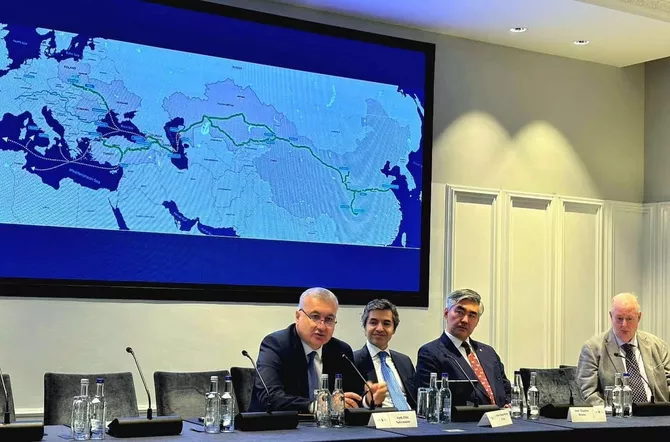
photo: Report
The recent London Conference on Trans-Caspian Connectivity put Azerbaijan firmly in the spotlight as a crucial driver of regional integration.
Bringing together influential leaders and experts from Central Asia, the South Caucasus, and Türkiye, the event underscored Azerbaijan’s strategic role in fostering cooperation, boosting trade, and advancing ambitious infrastructure and energy projects across the region, The Caspian Post reports via local media.
Organized by the Caspian Policy Center, the event titled “Harnessing The Momentum, Building on The Synergies” focused on the growing economic, commercial, and strategic potential linked to the development of the Trans-Caspian International Transport Route.
Lord John Alderdice, UK Trade Envoy to Azerbaijan and Central Asia and member of the House of Lords, highlighted the increasing role of the UK in fostering collaboration with the region. He pointed to British companies’ involvement in major infrastructure projects in Azerbaijan, including the UK Export Finance (UKEF) agency’s inaugural aviation finance deal with Azerbaijani carrier Silk Way. The UK’s active engagement in developing clean energy corridors in Azerbaijan was also emphasized.
Education cooperation was another key theme, with Lord Alderdice noting successful partnerships between British universities and institutions in Azerbaijan and neighboring countries through dual degree programs and specialist training.
Azerbaijan’s Ambassador to the UK, Elin Suleymanov, underscored the region’s growing interconnectedness and Azerbaijan’s pivotal role in regional connectivity, particularly via the Middle Corridor. Highlighting recent global events, he cited the Israel-Iran conflict as an example where Azerbaijan’s airspace served as a crucial alternative for civilian flights amid widespread airspace closures. He also recalled NATO’s selection of Azerbaijan as a key transit country for coalition logistics during the Afghanistan campaign.

photo: Report
Ambassador Suleymanov called for sustained cooperation beyond times of crisis, pointing to last year’s COP29 agreement among Azerbaijan, Kazakhstan, and Uzbekistan to establish the Caspian Green Energy Corridor as a landmark initiative.
The ambassador praised the UK’s expanding influence in the region, especially in green energy, finance, and post-conflict reconstruction. He also emphasized the pressing regional challenge posed by the Caspian Sea’s declining water levels, advocating for broad, cooperative efforts to address climate change impacts.
Efgan Nifti, CEO of the Caspian Policy Center, highlighted the rapid growth in trade, transit, energy, and people-to-people ties along the Trans-Caspian route. He noted increased interest from the European Union, France, Germany, Italy, China, and India, alongside a 62 per cent rise in trans-Caspian freight volumes last year. Nifti also reported that 25 per cent of the Trans-Caspian digital cable project has been completed, enhancing independent digital connectivity for Central Asia.
Share on social media